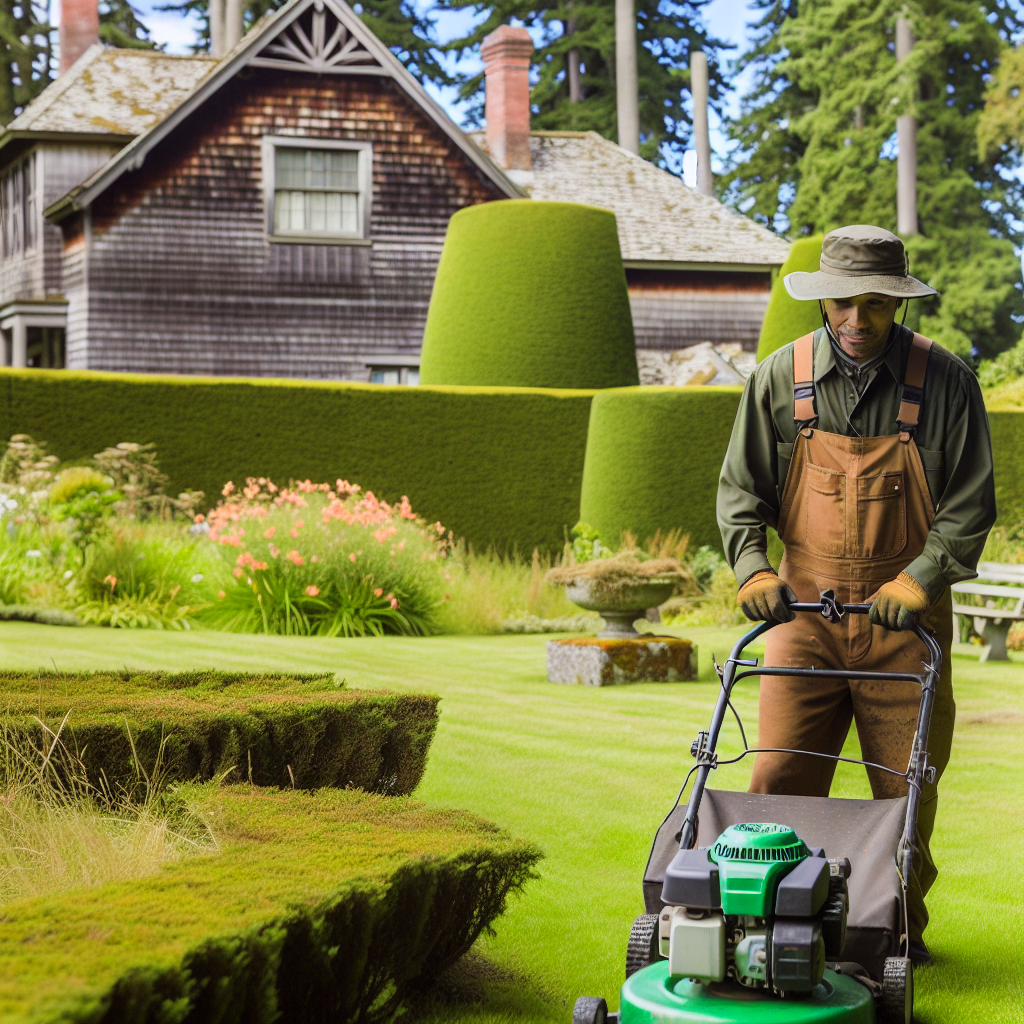Introduction:
Groundskeeping for commercial and residential properties is essential for maintaining a clean and attractive exterior.
It plays a vital role in creating a positive first impression for visitors and occupants.
Importance of Groundskeeping:
For commercial properties, well-maintained grounds can attract customers and enhance the overall image of the business.
It creates a professional and inviting atmosphere that can lead to increased foot traffic and repeat business.
On the other hand, for residential properties, proper groundskeeping enhances curb appeal and can increase property value.
A well-kept exterior can make a home more attractive to potential buyers and renters.
Both commercial and residential properties benefit from groundskeeping by creating a safe and welcoming environment.
Regular maintenance can prevent hazards such as overgrown vegetation or uneven surfaces, reducing the risk of accidents.
Differences in Size and Scope
Commercial properties are usually larger than residential properties.
This means more grounds to maintain for commercial properties.
Commercial properties may have multiple buildings and parking lots.
Residential properties typically have smaller lawn areas to manage.
The size and scope directly impact groundskeeping requirements.
Commercial properties require more resources and manpower for maintenance.
- Fieldwork
- Research
- Teaching
Budget Considerations:
Commercial properties typically have larger budgets for groundskeeping compared to residential properties.
There are more extensive landscaping features and maintenance needs for commercial properties.
Property owners of commercial sites often allocate a significant portion of their budget towards grounds maintenance.
Challenges for commercial properties include balancing the costs of upkeep with aesthetic appeal and functionality.
Contracting professional groundskeeping services can be expensive for both commercial and residential properties.
High-end residential properties may have similar budget considerations to commercial properties due to the size of the grounds.
Transform Your Career Today
Unlock a personalized career strategy that drives real results. Get tailored advice and a roadmap designed just for you.
Start NowLack of budget may lead to neglect of essential maintenance tasks, compromising the overall look and health of the landscape.
Property owners must prioritize essential tasks to fit within budget constraints while maintaining the property’s curb appeal.
Landscaping upgrades or enhancements may require a separate budget allocation to achieve desired results over time.
Regular maintenance is crucial for both commercial and residential properties to avoid costly repairs in the future.
- Commercial properties typically have larger budgets for groundskeeping compared to residential properties.
- There are more extensive landscaping features and maintenance needs for commercial properties.
- Property owners of commercial sites often allocate a significant portion of their budget towards grounds maintenance.
- Challenges for commercial properties include balancing the costs of upkeep with aesthetic appeal and functionality.
- Contracting professional groundskeeping services can be expensive for both commercial and residential properties.
- High-end residential properties may have similar budget considerations to commercial properties due to the size of the grounds.
- Lack of budget may lead to neglect of essential maintenance tasks, compromising the overall look and health of the landscape.
- Property owners must prioritize essential tasks to fit within budget constraints while maintaining the property’s curb appeal.
- Landscaping upgrades or enhancements may require a separate budget allocation to achieve desired results over time.
- Regular maintenance is crucial for both commercial and residential properties to avoid costly repairs in the future.
Delve into the Subject: Career Path: Becoming a Successful Drywall Installer
Design and Aesthetics:
Commercial properties often favor clean, modern designs.
Residential properties tend to focus on cozy, inviting aesthetics.
Landscaping choices can greatly impact curb appeal.
Commercial properties may prioritize low maintenance landscaping.
Residential properties might feature more diverse plantings.
Commercial properties often have sleek, structured hardscaping.
Residential properties may opt for more natural, meandering pathways.
Landscaping can convey a sense of professionalism or personal touch.
Commercial properties may use landscaping for branding and marketing.
Residential properties can create a tranquil, relaxing atmosphere.
Lighting choices in landscaping can differ for commercial and residential properties.
Commercial properties might use lighting for security and visibility.
Residential properties could focus on creating ambiance and mood lighting.
Decorative features like fountains or statues differ between commercial and residential properties.
Commercial properties may use large scale art installations for impact.
Transform Your Career Today
Unlock a personalized career strategy that drives real results. Get tailored advice and a roadmap designed just for you.
Start NowResidential properties might choose smaller, more personal decor elements.
You Might Also Like: How to Create Accent Walls with Bold Colors
Functional Requirements:
Commercial properties often have unique functional requirements for their grounds.
These areas must be well-maintained to provide a safe and inviting environment for customers and employees.
Groundskeeping for commercial properties may involve regular maintenance of parking lots.
This includes sweeping and repairing any damages.
Outdoor seating areas need to be clean, well-manicured, and free of debris.
This enhances the overall aesthetic appeal of the property.
Additional functional requirements for commercial properties may include green spaces.
These should be accessible and well-landscaped.
Focus on Residential Properties:
On the other hand, residential properties often focus on creating functional and usable outdoor spaces.
Groundskeeping for residential properties may involve maintaining lawns, gardens, and outdoor living areas.
These spaces should be designed to offer residents a place to relax, play, and entertain guests.
Residential groundskeeping may also include the maintenance of pathways, driveways, and fencing around the property.
The overall goal is to create a beautiful and functional outdoor space.
This enhances the quality of life for residents.
Gain More Insights: Safety Tips for Painters: Protecting Yourself on the Job
Maintenance Frequency:
Commercial Properties:
- Groundskeeping tasks should be performed weekly.
- Regular maintenance enhances curb appeal and attracts tenants.
- Lawn care, flower bed maintenance, and litter pick-up are essential.
- Professional services may be required for larger commercial properties.
- Consistent upkeep can prevent costly repairs in the long run.
Residential Properties:
- Maintenance can be scheduled for bi-weekly or monthly.
- Regular upkeep can increase property value and neighborhood appeal.
- Homeowners can handle tasks like mowing, weeding, and pruning.
- Personal touch in landscaping can reflect the residents’ style.
- DIY approach can save money but professional help might be needed.
Regular maintenance is crucial for both commercial and residential properties to sustain the value and overall appearance of the property.
By addressing groundskeeping tasks consistently, property owners can ensure that their surroundings remain attractive and well-maintained.
A well-manicured property not only improves the aesthetic appeal but also creates a positive impression on visitors and potential clients.
Transform Your Career Today
Unlock a personalized career strategy that drives real results. Get tailored advice and a roadmap designed just for you.
Start NowWhether it is a commercial or residential property, regular maintenance is key to preserving the long-term value and functionality of the space.
Learn More: Innovations in Masonry Materials and Technology

Environmental Impact:
When it comes to groundskeeping for both commercial and residential properties, there are several environmental considerations that need to be taken into account.
Here are some key points to consider:
- Water Usage:
- Commercial properties tend to have larger lawns and landscapes that require more water. Implementing water-efficient irrigation systems and using drought-resistant plants can help minimize water usage.
- Chemical Use:
- Both residential and commercial properties often use pesticides and herbicides to maintain their landscapes. However, these chemicals can have negative effects on the environment. Employing organic and natural alternatives can reduce environmental impact.
- Waste Management:
- Proper disposal of green waste, such as leaves and branches, is crucial for maintaining a healthy environment. Composting these materials can help reduce waste and enrich the soil.
- Energy Consumption:
- Using gas-powered lawn equipment contributes to air pollution. Switching to electric or battery-powered equipment can lower greenhouse gas emissions and minimize environmental impact.
In order to minimize the environmental impact of landscaping activities, sustainable practices can be implemented. Here are some strategies to consider:
- Drought-Tolerant Plants:
- Choosing plants that are well-adapted to local climate conditions can reduce the need for excessive watering, lowering water consumption and promoting sustainability.
- Native Plants:
- Utilizing native plants in landscaping designs can benefit local ecosystems and wildlife. Native plants are more resilient and require less maintenance, which contributes to sustainability.
- Integrated Pest Management:
- Instead of relying solely on chemical pesticides, integrated pest management techniques can be employed to control pests in a more environmentally friendly manner.
- Green Infrastructure:
- Implementing green infrastructure, such as rain gardens and permeable pavements, can help manage stormwater runoff and reduce water pollution, promoting a healthier environment.
By considering these environmental factors and implementing sustainable practices, both commercial and residential properties can contribute to a greener, more eco-friendly landscape.
It is essential to prioritize environmental consciousness in groundskeeping activities to ensure a healthier planet for future generations.
Professional Help:
Professional groundskeeping services play a crucial role in maintaining the beauty and functionality of both commercial and residential properties.
Here are some reasons why hiring experts in the field is essential:
- Expertise: Professionals have the knowledge and experience to handle various groundskeeping tasks efficiently.
- Time-saving: Outsourcing groundskeeping allows property owners to focus on other important aspects of their business or personal life.
- Consistency: Professionals follow a routine maintenance schedule to ensure that the property looks appealing all year round.
- Cost-effective: While there is a cost associated with hiring professionals, it can save money in the long run by preventing costly mistakes.
- Enhanced curb appeal: Professional groundskeeping services can enhance the overall appearance of a property, creating a positive impression on visitors.
- Specialized equipment: Professionals have access to specialized tools and equipment that are necessary to carry out groundskeeping tasks effectively.
- Increased property value: Well-maintained grounds can increase the value of a property, making it more attractive to potential buyers or tenants.
Investing in professional groundskeeping services for both commercial and residential properties can lead to long-term benefits and peace of mind for property owners.
Groundskeeping Differences for Commercial and Residential Properties
It is evident that groundskeeping for commercial and residential properties have significant differences.
Commercial properties typically require more frequent maintenance due to higher foot traffic and larger areas.
On the other hand, residential properties often prioritize aesthetics and creating a welcoming environment for residents.
Considering these distinctions, it is crucial for property owners and managers to tailor their groundskeeping practices accordingly.
Commercial properties need to focus on functional aspects such as safety and accessibility.
Residential properties can emphasize landscaping and curb appeal to enhance property value.
Maintaining the exterior of properties is essential for creating a positive first impression on visitors and potential tenants or buyers.
A well-maintained property reflects professionalism and care, ultimately contributing to the overall value of the property.
Neglecting groundskeeping can lead to a decline in curb appeal and property value, impacting the overall success and reputation of the property.
Additional Resources
Real Property Repair and Remodeling
Transform Your Career Today
Unlock a personalized career strategy that drives real results. Get tailored advice and a roadmap designed just for you.
Start NowResidential contractor licensing | Minnesota Department of Labor …




